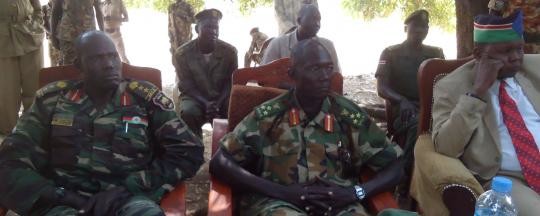Commissioner James Basha Tiwa, the top civil authority in Maban County, says the people of the county are organizing defenses against external threats.
Unlike other counties of Upper Nile State to the south, Maban County has affirmed its allegiance to the national government in Juba.
“I assure you of this. If any tribe from outside Maban tries to come, I will stop them at Kilo Ashara, from Kilo Ashara they will not enter here,” he declared at a public rally on Wednesday.
Addressing any potential aggressors he said, “Maban doesn’t have any problem with you. But you have a problem with Maban. I tell you, Maban is ready.”
“I am ready. We are ready. Whether it’s a militia or ‘white army,’ we are ready for anything… if fifty die, another fifty will take up arms,” he said.
He was speaking at a rally organized by the local authorities and youths. He described the purpose of the rally as demonstrating to the President Salva Kiir that all the people support him.
“Salva Kiir Mayardit is the President of the Republic, Maban says so. Up till now, Maban still says that he is the constitutionally elected leader of South Sudan,” said the commissioner.
Also speaking at the rally, the police chief of the county warned Dinka and Nuer members of the organized forces in the area not to cause trouble with each other.
He referred to the experience of 1991 saying that at that time the local authorities separated soldiers of the two groups who were posted in the county.
“We said we don’t want Nuer to kill Dinka, and we don’t want Dinka to kill Nuer,” said the police chief.
He also added that they don’t want fighting to take place in the county. “From now, we tell you, any Nuer who wants to go back to his brothers, let him go calmly, not doing anything. And any Dinka who wants to go to his brothers there, let him go calmly.”
File photo: Civil and military officials in Bunj, Upper Nile State, January 2013 (Radio Tamazuj)




